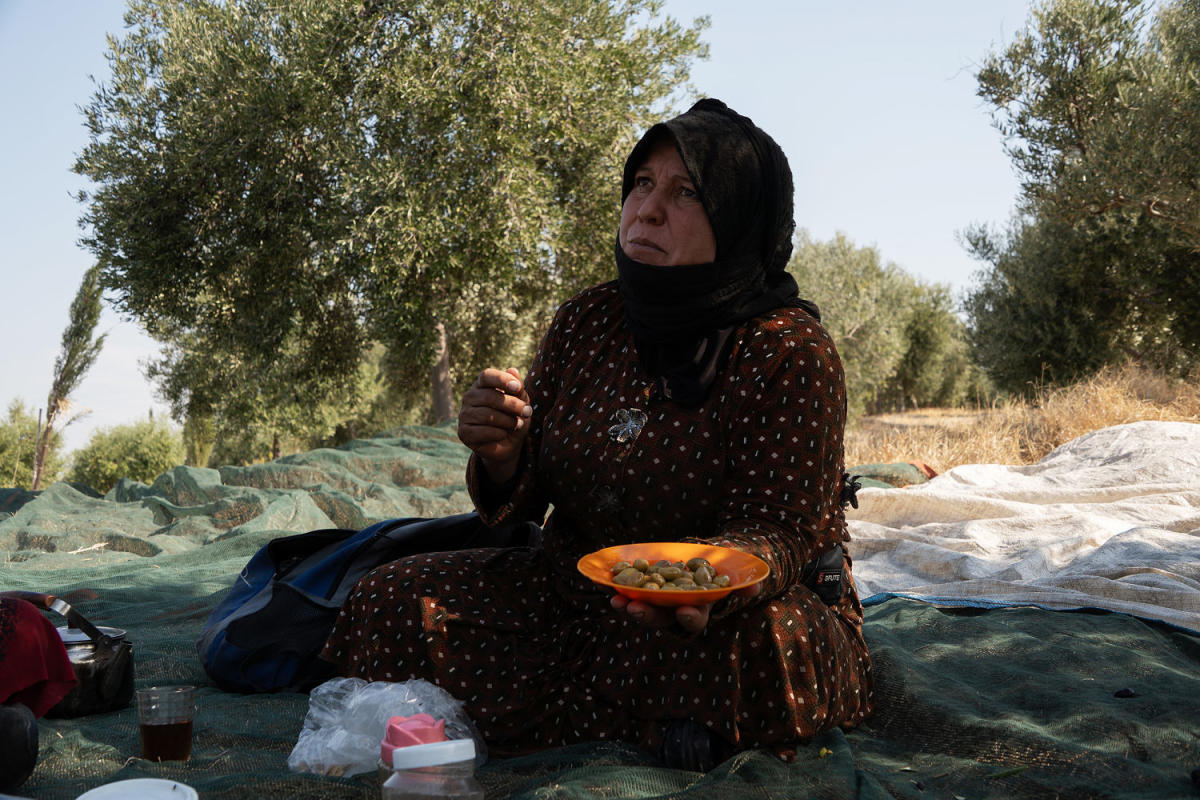AABRA, Lebanon — Mayada El Sayed, duct tape wrapped around her fingers to prevent bruising, efficiently strips ripe olives from a tree, seemingly undeterred by the ever-present threat of bombs.
El Sayed, 45, said she was scared by the regular strikes — one of which was less than half a mile from Bustan El Zeitoun grove where she was working, a few miles inland from Lebanon’s Mediterranean coast and a 45-minute drive south of the capital, Beirut — as Israel pushes into the neighboring country to fight the Hezbollah militant group.
The mother of three said she worried about something happening to her children at their home in the town of Haret Saida, the site of multiple Israeli airstrikes on homes and businesses. She said she feared she wouldn’t be able to get home to them.
Mayada El Sayed plucks olives from a tree.
Hezbollah began firing rockets into northern Israel the day after Hamas terror attacks on Oct. 7, 2023. Lebanese health officials say more than 3,600 people have been killed in the country since fighting began last year. The United Nations’ refugee agency says 1.3 million people have been internally displaced.
Hezbollah attacks have killed about 100 civilians and soldiers in northern Israel, the Israeli-occupied Golan Heights and southern Lebanon over the last year, according to Israel, and 60,000 civilians have been evacuated from the north. Prime Minister Benjamin Netanyahu has vowed to pursue military action against Hezbollah until those displaced Israeli families can safely return home.
Farm to table
Amid the death and mass displacement, farmers are experiencing other profound losses. Olives are one of the region’s key crops, but only one month into the conflict, more than 47,000 olive trees had already been lost in southern Lebanon, according to a February report from the Food and Agriculture Organization of the United Nations.
Since then it has only gotten harder for olive farmers, with Israel stepping up its air and ground campaign and moving troops and tanks into the region in September
“It’s very vulnerable for the farmers — they wait throughout the year to harvest, and they live from what they produce,” said Walid Mushantaf, manager of Bustan El Zeitoun.

Harvested olives on the ground at the Bustan El Zeitoun grove.
Mushantaf said many other farmers had been unable to get into their groves and that their harvests would go to waste.
He worked to build up his farm after the Lebanese Civil War ended in 1990 and said the land had previously been earmarked as a construction site before he converted it.
“I was born in this village, and I know my grandfather used to go to the olive grove and have a nap in the summer under a tree,” he said. “It was like his second home.”
El Sayed, who lives with her husband and their three children — Ibrahim, 16; Ahmed, 14; and Zainab, 12 — as well as her mother-in-law, said she is her family’s sole breadwinner.
“We have to pay bills — rent for the house, electricity, government bills for water, internet. We need to work, and to eat,” she said.
She goes home at the end of the day, but 15 other workers live at the grove.
One of them, Youssef Muqbil, 32, an Egyptian, said he relies on olive farming to support his wife and two children, ages 11 and 13, back home in Egypt.
When the workers at the grove hear about airstrikes nearby, they retreat into their houses, but that doesn’t stop the sounds.

Walid Mushantaf at his grove.
“The strikes are so near us,” he said, explaining how terrifying these experiences are for the workers.
The war has dealt a significant blow to Rose Bechara Perini’s company, Darmmess, after equipment used in processing the olives was bombed.
A lot of the farmers from Deir Mimas, the village where her business is based, have been displaced to Beirut and are waiting on a “miracle” that could allow them to safely return home to their livelihoods, she added.
“Olives are the economy. It’s our income, it’s our subsistence, it’s our heritage,” she said. “It’s everything in the village.”
This article was originally published on NBCNews.com


